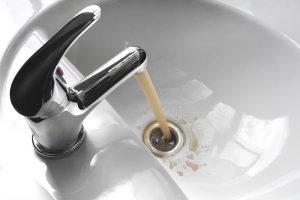 If the water flowing from your shower head or sink faucet is discolored, you could have a pipe problem. Corroding and rusting pipes are popular culprits of cloudy or brown water. The problem should be addressed as soon as you notice it. While rust is commonly the issue, other factors could be at play and even your health could be at risk.
If the water flowing from your shower head or sink faucet is discolored, you could have a pipe problem. Corroding and rusting pipes are popular culprits of cloudy or brown water. The problem should be addressed as soon as you notice it. While rust is commonly the issue, other factors could be at play and even your health could be at risk.
Iron is another possible cause of brown tap water. When iron corrodes, rust occurs. High iron content in your water could be to blame for the funny taste, rings left in the rub or toilet and issues with your dishwasher or washing machine. To determine if you’re dealing with high iron content or corroded pipes, start with a water test kit form your local home goods store.
Water Test For Iron Content
The water test kit measures the levels of iron, pH, manganese and other minerals. If your water tests positive for high iron levels, you’ll need to then determine if you’re dealing with soluble or insoluble iron. You can remove iron and other minerals from your water in a number of ways:
- Aeration
- Chlorination
- Filtration
- Greensand
- Ion exchange
- Ozonation
- Softening
A whole house water filtration system if the most common cure for high iron levels or hard water. A water softener system can also help to remove iron from water.
If, however, the test shows iron levels are normal, you will want to investigate your pipes.
Sewer Camera Inspection
The only way to see the inside of your pipes is to hire a professional plumber to perform a sewer camera inspection. The plumber will insert a waterproof, high-resolution camera into a preexisting access in your system. The camera is guided through the pipes to get a real-time look at buildup, clogs and corrosion.
The video should show the pipe’s condition and reveal if there is severe rusting in particular sections or if the entire plumbing system is affected. From there, you can determine the best solution for your needs and budget.
The plumber may recommend a pipe lining solution if a small portion of the system is rusted. This fix can be performed without digging up your yard and home flooring. With just one or two small access holes, a professional plumber can clean your existing pipe and insert a new lining, which would restore optimum flow rate and remove the threat of rust contaminating your water.
Most plumbing systems are designed to last for 60 years or more, so consider the age of your plumbing system before making any costly repairs. If you’re approaching the time for a complete overhaul, it may be less costly to make a major change all at once rather than make continuous repairs to an older system.
One of the best ways to prevent rust from entering your drinking water is to schedule routine preventative maintenance. Yearly inspections and regular pipe and drain cleaning services can prevent buildup and severe corrosion. You’ll not only avoid rust-colored water, but you can also extend the life of your entire system.
